ICCA South Quarterfinals at Johns Hopkins University

On Saturday, February 19, 2011 Shriver hall at Johns Hopkins University played host to an ICCA South Quarterfinal. The event featured ten groups. Before we get to the review, a quick summary:
The Competitors:
The University of Maryland Baltimore County Cleftomaniacs
The University of Maryland Baltimore County Mama’s Boys
University of Delaware Vocal Point
University of Maryland Faux Paz
University of Maryland PandemoniUM
The Johns Hopkins University All-Nighters
Salisbury University Squawkappella
St. Mary’s Collegeo f Maryland Interchorus
The Johns Hopkins University Octopodes
The Johns Hopkins University Vocal Chords
Host Group:
The Johns Hopkins University Octopodes
Guest Groups:
The Johns Hopkins University Mental Notes
The Johns Hopkins University Sirens
Photos from the event are available now on our Facebook page.
JHU’s comedy a cappella group, The Mental Notes, opened the night with Flight of the Conchords’ “The Humans Are Dead.” Very fun opener. I’ve heard good things about The Mental Notes, but despite living in Baltimore, I had never gotten around to seeing them perform before. This wasn’t anything special from a musical perspective, but I’ll be darned if it wasn’t entertaining. It left me actively looking forward to the judges’ deliberations so I could hear more from them.
ICCA South Producer Lindsay Howerton offered up the standard introduction before handing over the mic to the emcee. Let me speak my peace about the emcee before I go any further. The guy was funny, engaging, and very personable. I can definitely see why he would be selected to guide us through the show. With that being said, it was incredibly annoying that he kept asking the audience not to clap between songs, clearly misunderstanding Howerton’s instructions that the crowd should applaud between songs, but keep it to an “enthusiastic minimum” so it didn’t take away too much time. It grew especially aggravating that he chastised audience members for still clapping between numbers after almost every set, which is probably going to mislead a lot of first time ICCA attendees that this is how an audience conducts itself at ICCA shows. I would have thought someone would have corrected him over intermission, but unfortunately, it went on and on to the point where it actually started to take away from the show for me a little bit.
End rant.
The first competing group was The Cleftomaniacs out of University of Maryland Baltimore County. The mixed group wore electric blue tops with black pants and ties for the guys, black dresses with blue belts for the girls. They opened with a Lady Gaga medley. I had very mixed feelings about this. On one hand, it’s a very good idea for a song. I reckon Gaga has about one to two years worth of time left on the level of a divinity in the worlds of pop music and collegiate a cappella, so now is as good of a time as any to pull her greatest hits together while they’re still relevant, and before such medleys are being done completely to death. With all of that said, there were two major drawbacks to this song. The first, and easier fix, is set placement. Sure, you want your first song to really draw the audience in, but moments like that slick transition into “Bad Romance” could have been the stuff of high drama to really end a set on the highest of notes. In starting with a Gaga medley, just in terms of song selection, The Cleftomaniacs gave themselves a very tough act to follow. OK, so that’s the first issue. The second issue was all around execution. The solos were mostly good, the percussion was good, the choreography was a little excessive, but mostly befitting of the songs. But there was still just an “it factor” missing from this performance. A part of the issue is dynamics. The group by and large remained at a consistent volume level for the full song, and particularly on a medley, and for material as inherently theatrical as Gaga’s, we need dynamic variation to tell a story and build to those big moments. Another issue is arrangement. The individual pieces of the song were generally OK, but exposed for the length of time spent per song segment, coupled with the number of songs we heard. The group seemed determined to fit in as many songs as possible, and as much of each song as possible. This is a case of quantity coming at the expense of quality, and it did not serve the group well.
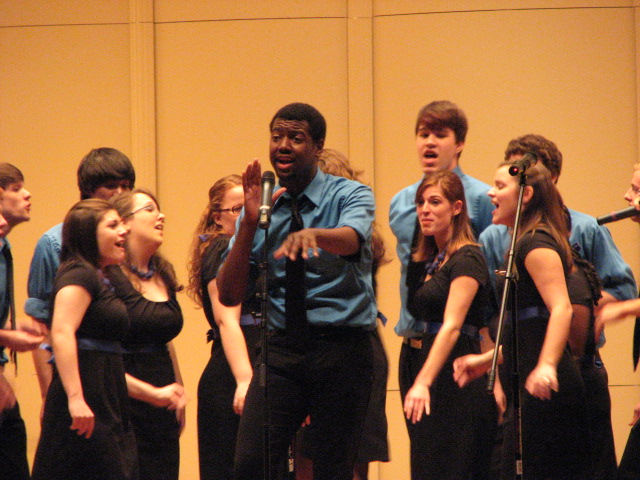
Next up was Mika’s “Grace Kelly.” This is an extremely bold song choice after the Whiffenpoofs—and particularly their soloist—so thoroughly owned this song on as high profile of a stage as The Sing-Off. When you perform a song that’s already high profile in the a cappella format, you are openly inviting comparison. To their credit, the group performed well. In particular, I like that the soloist put his own spin on the song, making it a little more soulful, but still more or less nailing that soprano part. I like that the choreography was a bit less pronounced on this one, and that the bulk of it was quite applicable to the song itself--stepping back on “walk out the door,” entering marching formations when the music took on a bit of a military beat. Between these first two songs, I got the feeling The Cleftomaniacs were really swinging for the fences with this set. Though they may not have quite made contact on each turn at bat, you do have to respect the mighty swing.
The Cleftomaniacs closed on VV Brown’s “Shark in the Water.” Very nice solo on this one, though I would have liked for her to have let loose and ripped a little toward the end—after all, this was the group's last chance to make an impression. Fun choreography. My biggest gripe on this number was that the syllables seemed to grow a bit repetitive and grating with the “chang-chang-chang-kechang” thing. All in all, a good closer to a good set.
The second competing group was University of Maryland Baltimore County’s Mama’s Boys. The guys wore all black with white ties and yellow suspenders. Not a bad look. They opened with Nelly’s “Just A Dream.” I love this as a song choice—it’s contemporary, fun but edgy, distinctively male, and I haven’t heard it done a cappella before. With all of that said, I’m sorry to say that guys, and particularly the soloist, just sounded so white. There’s something to be said for making a song your own, and I appreciate the decision not to try to imitate Nelly’s vocals. But a song like this has an element of urban swagger inherent to it, and unless you’re going to reinvent the whole thing, a solo like that just isn’t going to fly. The blend wasn’t fantastic from the group. The choreography was tremendously ambitious, and at points—particularly the slide move—quite good, but at other points, just a quarter step out of synch. The strongest part of the opener was probably the percussion.
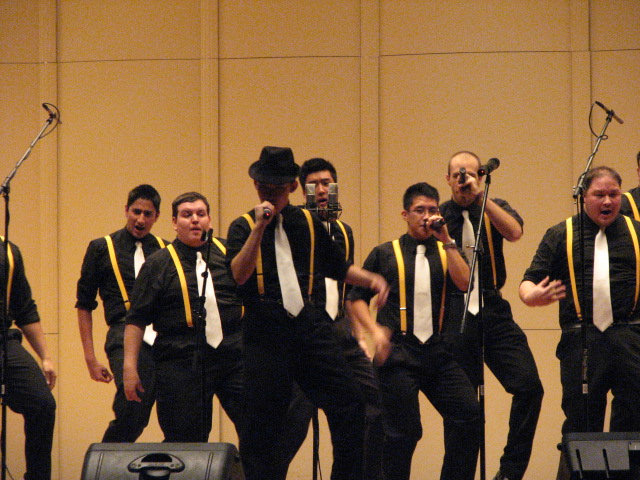
The Mama’s Boys moved on to their second song, “Funny the Way It Is” by Dave Matthews Band. It’s funny because, in many respects, I had similar feelings to this song as I did to the one before it. Again, I love the idea of the song, and it’s placement in the set. It’s a cool, fairly contemporary song, ripe for an a cappella cover. But it’s not the kind of song that a group can just take verbatim and translate to a cappella. One of the dirty little secrets of segments of the DMB catalog like this are that they’re long and repetitive, which works for the band because of its inclination toward epic instrumentation, and because it lends itself well to grooving jam sessions at concerts. In a cappella, though, you either need some epic plans to meet the music, or you need to be very smart about making cuts and/or sampling something else into the song. Unfortunately, as far as I could hear, The Mama’s Boys did neither. Though the visuals and sound were both good, after so many iterations of the same lyrics, melody and moves, the performance grew really redundant. The biggest change I would have suggested would have been to slow down the tempo, and focused less on choreography per se, more on movement to sell the meaning of the song. By my interpretation, this is a bit of a (muted) message song, which affords a group opportunities to sell it in a serious, powerful way, as opposed to hand jives and side steps. The guys ended pretty abruptly, too—just a minor quibble.
The Mama’s Boys wrapped up with “Feelin’ Good.” I felt this was the first point at which things really came together for the group. Good, slick solo. While I usually frown upon the use of props, the subtle step of the soloist putting on a top hat helped sell the vibe of the song. The dynamics here were far better diversified than previous songs, which was nice to see from the group. The choreography in this song was probably better than it had been for any other part of the set, if just for sheer applicability and originality, with movement rooted far more in physical placement on stage, as opposed to synched up waves and steps. My only complaint there is that the visual presentation seemed oddly reminiscent of what the SoCal VoCals did with the song in 2008. Maybe it’s just a case of the song organically leading groups to similar places, or maybe I’m remembering the two performances as more similar than they really were—either way, it just seemed odd to me. Anyway, a fine end to the set that helped show the potential of this group. Ordinarily, I would recommend a song like this go in the middle of the set, but I can also see where the group was going, ending on its strongest piece. Anyway, good, if unpolished set. Good song selection, and the guys have a good foundation from which to build.
Vocal Point out of The University of Delaware sang next. The mixed group looked sharp, if a little under-uniform—most of them in jackets and jeans, with a handful of exceptions, a general color scheme of black and gray. The group opened with ”Secrets by One Republic. The group made the odd decision, pretty early on, to transition from a traditional solo to having a group of the women on stage sing it chorally. This is a case of a foreign stage and mic set up hurting a group. I have to imagine this song has sounded better at home performances, but without any of the women who sang the lyrics having a mic, their sound was just barely audible and distinguishable from the rest of the group, singing the instrumentation. It was more or less the same deal for the guys, though they came through a little more clearly. The best point of the song came when the instrumentation fell out and the group executed very precise stomp and clap percussion, and allowed the lyric line to finally come through quite clearly. Uneven start to the set.
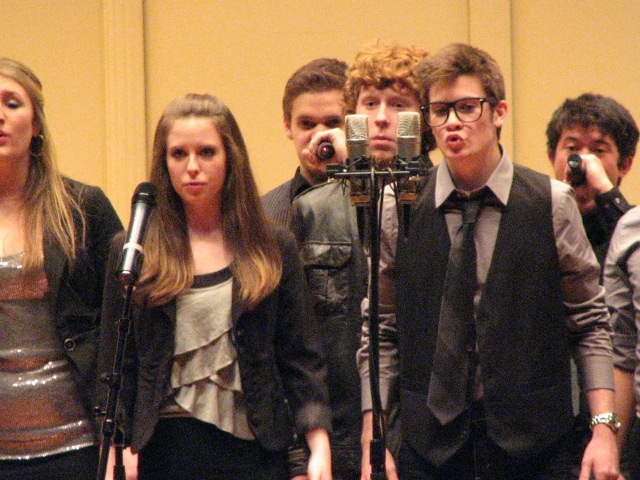
Next up was James Taylor’s “You’ve Got a Friend.” Conceptually, this was really neat--the group reinvented a classic, with a cool, grooving take on the melody that worked quite well. The soloist represented a prototype for what I’m not so keen on in collegiate a cappella solos--you have someone who is clearly quite talented, with very pretty tone, who decides to keep everything as technically precise as possible without a hint of a emotion or tonal variation. I’ve seen plenty of soloists go the emotional route and tank because of a lack of intonation, and that’s no better (it’s probably worse). But to know that all of that potential is there, but is getting squandered is really frustrating. Elsewhere in the song, the choreography grew a bit overly literal for my tastes, and the group went for a big clap along before it had really earned it, and the audience responded accordingly by not joining them. You need to be smoking on stage to warrant a clap along before your last song, and Vocal Point just wasn’t there yet. Good second song, but not what it could have been.
Vocal Point closed with Paramore’s “Ignorance. the song got off to a rocky start with the percussion booming loudly enough to sort of swallow the solo. When the soloist did come through, she sounded good, but didn’t present quite enough attitude to really fit the song. I liked that the song built as it went, growing louder, and throwing in the neat addition of one of the girls screaming in the background, for an eerie effect. All in all, it was a good closer to a good set, that probably could have been all the more effective with just a little more power, and a little more forethought about the context of performing these three songs in front of a foreign audience, in a foreign place.
The fourth group was The University of Maryland’s Faux Paz. The mixed group came out in sharp black and red ensembles. They opened with “Animal” by Neon Trees. Nice, distinctive start with clapping, and a nice build, with the group getting bigger and bigger leading into the chorus. The soloist was quite good, though his voice was a little classical-sounding for the part. The group made very good use of its choreography, holding back until the bridge, which is exactly how you make the choreography you do employ mean something. The group broke in with a choral interlude, only to break it up with the return of the percussion, to be followed with the return of the full group. This was fluid, varied, and fantastically conceived. In the end, I would have liked a little more fire power from the group in general, but they did a fantastic job of storytelling and really won me over by the end of the song.
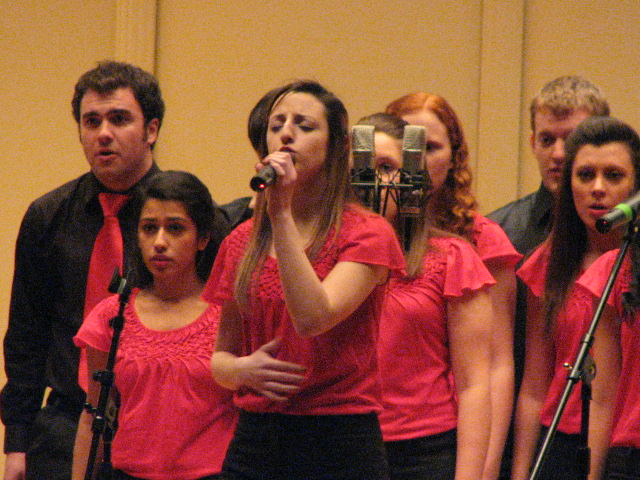
Next up was Celine Dion’s “I Surrender.” In an upcoming edition of “The 5s” I’m going to explain why more groups should espouse Celine Dion, so I’ll save many of the reasons why this was a good decision for that later post. In any event, this was executed to a tee--nice blend, and particularly a nice bass sound on the first verse. The group added in its percussionist for the second verse, another step toward building a song nicely as it goes. And then there’s the soloist. She sounded quite good throughout, but I was worried early on that she was going to fall in the same trap as the overly-precise soloist from Vocal Point. Thankfully, much like the group, she let her solo tell a story, getting bigger and stronger as it went before positively exploding coming off of the bridge for a fantastic effect. Very nice middle song.
Faux Paz stayed in position as the crowd applauded, then used the start of the third song to step and sway into a new formation. Nice, efficient use of the stage and set timing. The group launched in to Florence and the Machine’s “Cosmic Love.” I would have liked to have seen a more firm shift in mood from the previous song, but this still made for a nice, distinctive closer. Good sound from the group, and very nice effect when the backing solo joined the primary soloist. Good percussion. This wasn’t a knock-your-sox-off closer, but it was a very respectable way to round out a stellar set.
Next up, University of Maryland PandemoniUM took the stage. They wore mostly black with red ties for the guys, red belts for the girls. The group started off with some interesting, almost animalistic sounds that were a bit silly, but served their purpose in drawing the crowd in and centering its attention. From there, the group launched into Stevie Wonder’s “Don’t You Worry ‘Bout A Thing.” Sort of an odd choice for a set opener, for how mellow it is. The group wasn’t quite chill enough to really execute the attitude of the song. Nonetheless, a good solo, and they put bits of dynamic variation into play. Not bad.
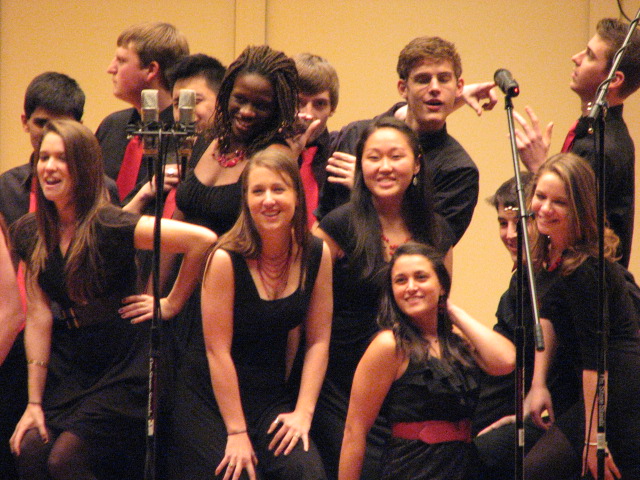
The group carried on with its even keel on Michael Buble’s Hollywood. There’s nothing inherently wrong with a song like this or the one before it, but in a competition setting, you really need to do something new with the material, or truly master every aspect of it if you want to engage the audience. The solo was good, the blend was fine, the choreography was all right but just kind of there. Had the group offered up a higher energy opener, they may have been able to justify a cool down song like this, but as it was, this song was just a bit blah, and put the group in a bit of a hole heading into its last song.
PandemoniUM wrapped up with Evanescence’s ”My Immortal”. The solo was very good, but came across a little too high to really fit the song, or come across comfortably. The group blended quite nicely at points, but the soprano syllables grew a little grating and repetitive at the start of each verse. As proven by so many of the groups that have covered this song in recent years, the bridge of this song is an opportunity to really pour on the emotion and intensity, but the group just sort of went about its business instead. The sound built more for the final chorus, but it was a bit too little a bit too late. OK finish to an OK set.
The last group to perform before intermission was The Johns Hopkins University All-Nighters. The guys wore vests and ties over white collared shirts and khakis. This group was the only group of the night to run out on stage. It’s a little thing, and it’s kind of silly, but I always like to see groups do this in competition—it shows energy and confidence. The group opened on Toto’s ”Africa”. Nice, full sound from the group. The dynamic variations were actually a little excessive here, ranging a bit randomly in the verses. The solo was uneven--good at points, but he fell flat more than once. The backing solo came across quite nicely, and supported him well. Fun movement--shunning choreography for much of the song in favor of crouching and bobbing. I love choreography where it fits, but when you don’t have a fit, or can communicate the energy of the song more clearly without it, you’re all the better for leaving it out. Good, if imperfect high energy opener.
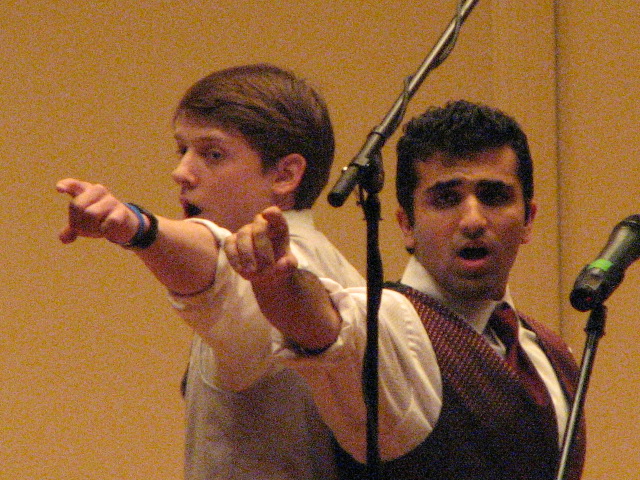
Next up was Radiohead’s “Creep.” I liken this song selection to The Cleftomaniacs taking on “Grace Kelly.” A similar choral rendering of this song figured prominently into trailers for The Social Network, which gives the audience a direct point of comparison for this song with a professional quality version. Fortunately, the guys were largely up to the task with very good blend, intonation, and dynamics. As the song went on, the guys escalated their level of movement, pairing off back to back and interacting with one another in various, slow motion ways. It was a little cheesy, but I don’t actually think the guys were playing for laughs. Nonetheless, the crowd did in fact laugh in response. This may be one of the few cases in ICCA history of home field disadvantage. The crowd, eager to support the group, stripped the song of some of its emotional richness and inadvertently made it into a comedy piece.
The All-Nighters wrapped up with Phil Collins’s ”You’ll Be In My Heart. Good solo and percussion. I dug the decision to up the tempo on this a little, playing it less as a ballad, and more as an inspirational tune. The guys did a nice job of building this set. It all felt organic, and one song fed into another, maintaining a nice balance of harmony and power. Nice moment coming out of the bridge and reaching the end of this song. I think the group probably should have gone for a crowd clap at the end, given the tenor of the song and home crowd. Nonetheless, a good close to a good set.
Intermission time. I don’t know if it’s the building or the crowd, but Shriver was a madhouse trying to get in and out of the auditorium. It didn’t seem nearly as nutty the last two years, but maybe that’s just my experience.
Salisbury University Squawkappella opened the second half. The mixed group wore a mix of black and gray. They opened with Mariah Carey’s ”Always Be My Baby.” In terms of song selection, unless you’re doing something brand new, or taking off on the David Cook version of the song, it really doesn’t have much of a place in competition. Despite the questionable pick, though, the group did execute the song well with a strong solo and percussion. I particularly liked the the way in which the group members--particularly the women--sold the song visually. A lot of groups fall back on choreography at the expense of body language. These group members looked devoted and emotional without being silly or overwrought. The visual presentation was very arguably better than the song choice deserved. The song, on the whole, was a pleasant surprise of a good opener.
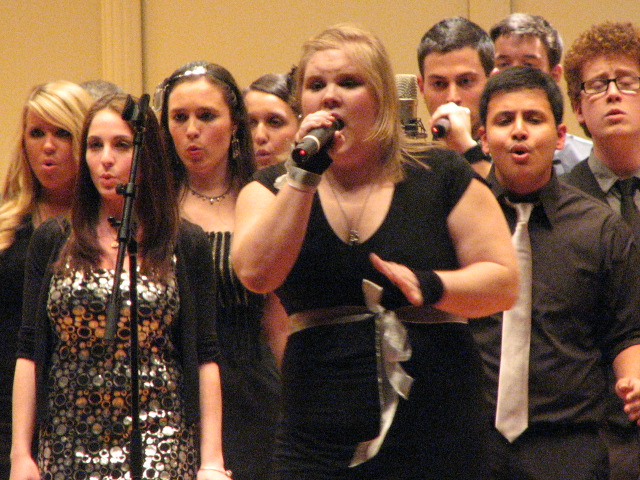
Squawkappella transitioned next into Boyz II Men’s “End of the Road.” Does this group have a gimmick that it only performs songs from the early 90s? Because if so, I could get behind these song selections (and, I actually kind of love the idea of a group that would devote itself to that time period). Anyway, nice solos which both built very nicely as the song went along, and the two of them played off one another very nicely. Good emotion all around for another performance of a song that was far better than the song selection would lead you to expect.
The group wrapped up with Adele’s “Rolling in the Deep.” Nice song pick, although it blew my theory about the whole early-90s cover group thing. Oh well. Powerful, soulful solo on this one--very much in contention for the best of the night. Nice percussion. The group sound was a little thin, beneath the solo and percussion. The group arrived at a nice effect toward the end, though, when the instrumentation fell out in favor of the group clapping while the soloist sang for a very cool effect. Strong close to a strong set.
The eighth group to take the stage was St. Mary’s College of Maryland’s Interchorus. Heh, heh. I’m not sure how this group, and this particular punny name escaped my attention prior to this show, but all I can say is bravo to the ensemble’s founders. Anyway, the mixed group wore all black, with purple suspenders for the guys for a decent look. The group clustered into a groups of four, frozen in place while the soloist walked around stage and scatted, one by one luring the groups into motion, and into following his lead. It was a neat visual, sounded good, and was memorable way to open a set but I kept hoping it was leading somewhere, and it really never was. The instrumental piece ended with everyone singing together. It went on long enough and with little enough direction to be more confusing than entertaining.
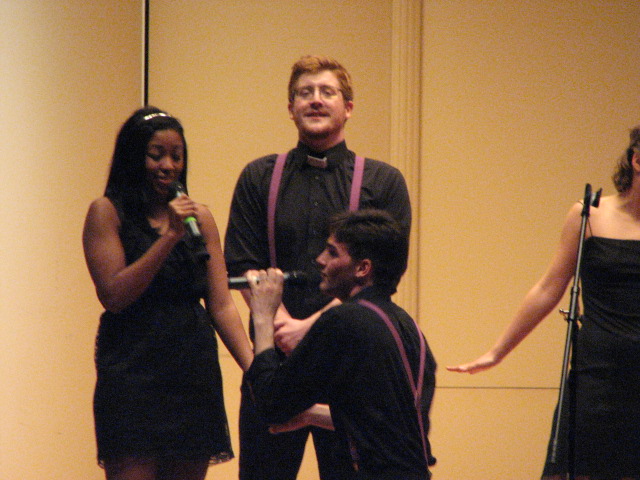
Interchorus followed with “Hide and Seek” by Imogen Heap. Long time ACB readers will know my feelings on this song, but for the uninitiated, around 2007-2008, approximately 85% of the a cappella universe came to the simultaneous conclusion that this was a really neat song that they should try to cover--and cover it they did, with just about every ICCA show I attended including at least one rendition of the song, often two or three. As much as I do like the original a great deal, and a few years have passed, I’m still sick of hearing this song a cappella. Although Interchorus didn’t put itself up against a particular high profile version of a song (like The Cleftomaniacs and The All-Nighters) the sheer volume of versions of this song make it comparably subject to comparison. Just about every group does this song chorally. Just about every group integrates some subtle movement. The sound wasn’t bad here, and it the movement was appropriately understated and fairly well-executed, but ultimately, this performance didn’t add anything new to the storied history of this song. Furthermore, this is a song selection that demands precise dynamics, intonation, enunciation, and blend. Interchorus wasn’t actively bad in any of these areas (though the sopranos skated perilously close on the less than perfect slide into their part) but it also wasn’t remarkably strong, leaving the song overall a bit underwhelming.
Interchorus wrapped up its set with Bruno Mars’s “Marry You.” This was a really fun idea for a closer, and I appreciate that the group espoused a light-hearted identity and just went for it on the cheesy facials and choregraphy. No, this was not a masterpiece, but it was a lot of fun and the soloists showed good stage presence for a warm closing song.
The ninth and penultimate group to compete was The Octopodes out of Johns Hopkins University. They mixed group came out in its trademark blue and black, and opened with Florence and the Machine’s “Cosmic Love.” It’s awkward when two competing groups choose the same song, because usually the best you can hope for is that the groups will have distinctively different takes on the song--otherwise, it’s a clear opportunity for one group score points over the other. This was an interesting performance for the ‘Podes. The solo came across a bit uneven. I recall hearing the soloist sing “Hot N Cold” last year, and I thought she was fantastic. Unfortunately, I think that in this one she was a little too concerned with filling up the big vocals of the song and got too yell-y too fast. This was a really interesting piece from a visual perspective. On one hand, I can’t help feeling it was over-choreographed just given the volume of movement. On the other hand, I’ll be darned if the visuals weren’t simply cool when the group members waved their arms in slow motion. Otherwise, good group sound, and very good percussion on this one.
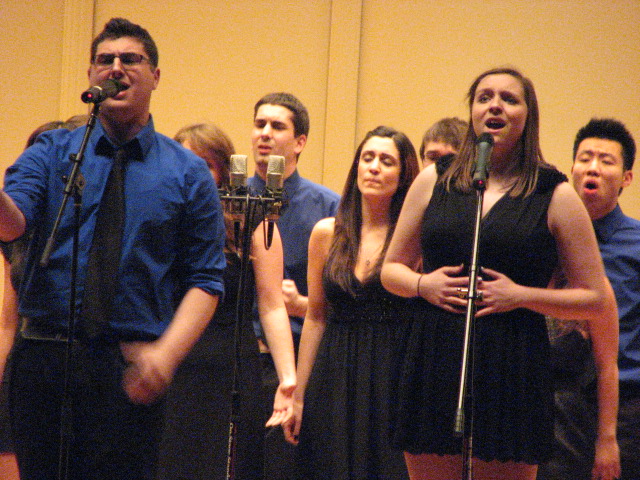
The next song was “Breakeven.” Nice, big solo on this one, and outstanding harmonies with the backing solo. I really liked the repetition of “she doesn’t know” for the syllables on the bridge, and the group used dynamics to its advantage to build quite nicely for an epic finish. One of the things The Octopodes did especially well was to pick songs with a common thread of having sort of a mellow, melancholy core sound, but creating big moments of sound and generating visuals that were engaging enough to keep the crowd invested and excited.
The Octopodes wrapped up with a mash up of Katy Perry’s “Firework” and Muse’s “Starlight.” Excellent percussion. Fantastic solo to start. Though the solo got a little big a little too soon, that’s kind of the very nature of a Katy Perry song, and it worked given the second-verse transition to the Muse song. The second soloist more than held his own. I love the combination of these songs both for the sound quality and the mix of music sensibilities--when you cover both Perry and Muse you’re probably going to offer something for everyone. With that being said, I wondered if the mix would have been even more compelling had the songs been reversed, starting with “Starlight” ending with the more crowd-friendly “Firework.” Of course, there’s also something to be said for leading off with the song more people will know. Anyway, the truest highlight of the song arrived at the end, when the true mashing happened--just two outstanding soloists sharing the spotlight for the night’s most epic aural moment. Excellent ending to a strong set.
The Johns Hopkins University Vocal Chords closed out the night’s competing groups. The mixed group wore black and white formal attire, with red ties and suspenders for the guys. The group started out with some body percussion, which I almost always enjoy. Well-placed beats of their chests and stomps. They opened with Marc Broussard’s “The Wanderer”. I’ve heard this song translated to a cappella a handful of times and find that, for dramatic purposes, it’s generally best treated as a ballad until the bridge, when the group can let loose—sort of an exaggerated version of the original. In any event, The Vocal Chords went a more pop-ish route with it, keeping the whole thing upbeat and relatively light-hearted. Good solo, and good sound from the group all around.
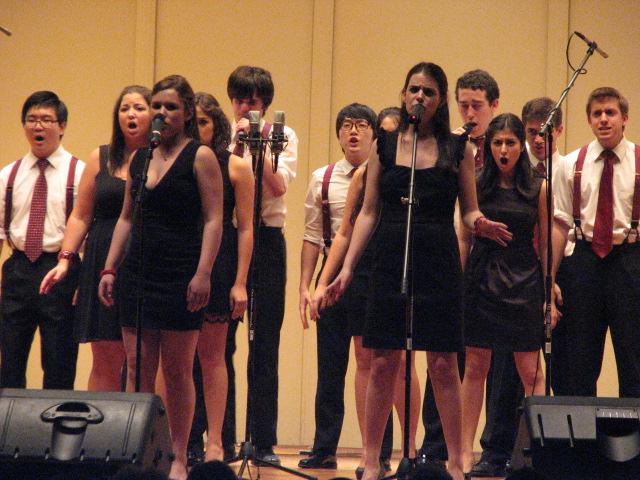
The Vocal Chords followed up with "The Dark I Know Well." from Spring Awakening. I try not to bias myself in favor or against a song based on song content, to rather focus on the way the group executes it. With that being said, a song about child molestation is pretty awkward for the context of the show, and particularly because I felt, with the exception of the soloist (who was quite good all around) the group just wasn’t intense enough for the performance, and just came across--well, musical theatre-ish in both their musical style and movements, for an oddly light-hearted-feeling treatment of some profoundly dark subject matter. Creepy visual when the girls paired off with the guys. All in all, this was a really interesting choice for song, with uneven execution. Tonally, I just felt it was uncomfortable fit for the show unless they were really going to go all out selling the emotion as a group.
The group closed with “Misery” by Pink. Good, jazzy solo, and a nice backing solo to support it. Solid percussion. I like that the group held back on the movement until relatively late and kept it subtle, but used it to match transitions in the song. Kind of annoying guitar simulation late in the song, but that’s my biggest quibble. All in all, it was a solid closer, for a good, if sort of underwhelming set. In fairness, a I think I was a little harder on this set than others just for being a bit worn out at the close of ten sets of a cappella. With the marathon shows ICCA has been going with this year, it sort of begs the question of what’s better--to go early in the show and risk being forgotten, or to go late when everyone watching is a burned out?
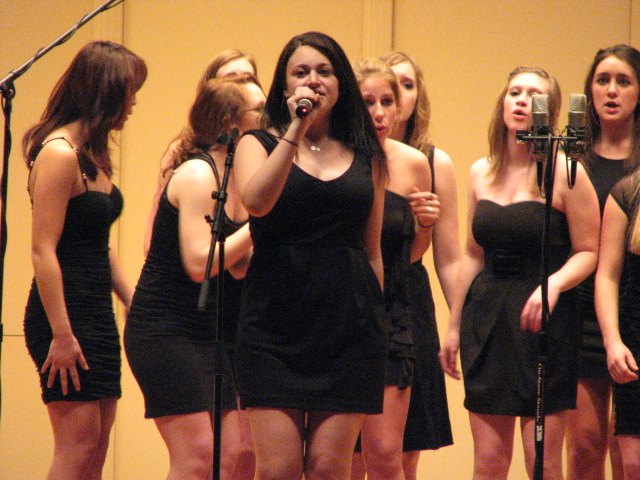
As the judges deliberated, The Johns Hopkins University Sirens took the stage to sing songs including “Telephone,” “A Change In My Life,” and “Unwritten.” From there, The Mental Notes got back on stage for a series of parodies and humorous songs including “Holding Out for a Gyro,” “Part of Frat World,” “Stalk Me,” and “One Semester of Spanish Spanish Love Song.” As much as I was growing weary after a full night of a cappella, I do have to say The Mental Notes were one of the best choices possible to handle deliberation duty for the sheer different brand of entertainment they bring to the stage.
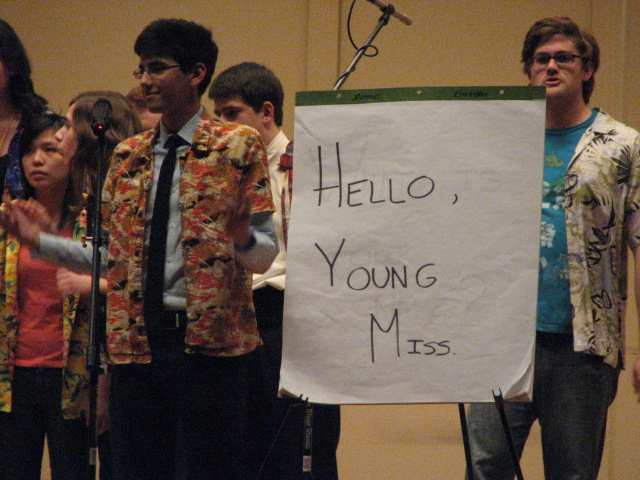
Meanwhile, I figured out my picks for the night. I thought it was a two group race to the top between Faux Paz and The Octopodes. Faux Paz was more consistent and made smarter decisions overall. The Octopodes, at their best, far outshone anyone in the night. Overall, I just barely gave The Octopodes the nod, in part for the sheer awe of their closer, in part out of recognition of the potential for their version of “Cosmic Love” to be all the better when solo lives up to its potential. I had The All-Nighters coming in right behind those groups for a fine set with even less even execution. Squawkappella were my dark horse pick to crack placement, with The Vocal Chords right behind them. I favored the Faux Paz solo for “I Surrender” for best solo, and The Octopodes for choreography on “Cosmic Love,” and for arrangement and percussion on the “Firework”/”Starlight” mash-up.
All in all, few surprises in the judging. The Vocal Chords, of course, finished a little higher than I expected, and I was surprised at the decision to award The Mama’s Boys outstanding choreography, though it was good to see their level of effort rewarded, and not see them go home empty-handed. All told, the right two groups are moving forward.
The Octopodes closed out the night with a fine performance of India.Arie’s “Therapy.” Above all, I have to say I was proud to see the progress The Octopodes have made in recent years. For readers who may be interested in reading more about the night’s big winners, the ACB ran a feature profile on the group last January, which you can read here.
ACB Picks for the Night
Overall Placement:
1. The Octopodes
2. Faux Paz
3. The All-Nighters
4. Squawkappella
5. The Vocal Chords
Best Soloist
1. Faux Paz for "I Surrender"
2. The Octopodess for "Firework"/"Starlight"
3. Squawkappella for "Rolling in the Deep"
Best Arrangement: The Octopodess for "Firework"/"Starlight"
Best Vocal Percussion: The Octopodess for "Firework"/"Starlight"
Best Choreography: The Octopodes for "Cosmic Love"
Official ICCA Results
Overall Placement:
1. The Octopodes
2. Faux Paz
3. The Vocal Chords
Outstanding Soloist:
(tie)
Squawkappella for "Rolling in the Deep"
Faux Paz for "I Surrender"
Outstanding Arrangement:
(tie)
The Octopodes for "Firework"/"Starlight"
Vocal Point for "Secrets"
Outstanding Vocal Percussion: The Octopodes for the full set
Outstanding Choreography: The Mama's Boys for the full set